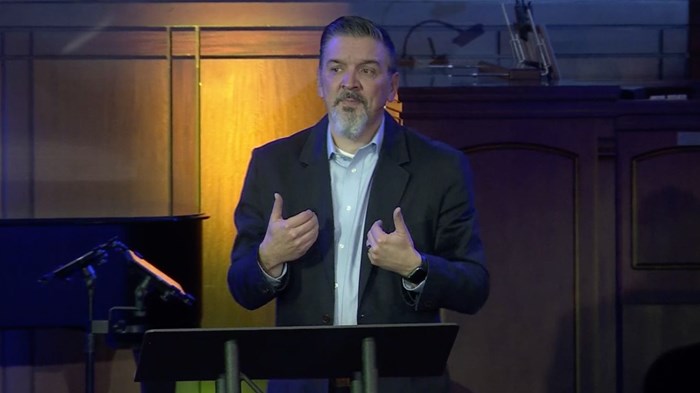
Regional leaders of the United Methodist Church (UMC) took control of an 8,000-member congregation in suburban Atlanta earlier this month after a lengthy conflict over who should pastor the church.
The North Georgia Conference seized assets of Mount Bethel United Methodist Church in Marietta on July 12, a move that has sparked tensions already roiling over the denomination’s ongoing conflict around same-sex marriage and LGBT ordination.
Back in April, North Georgia Bishop Sue Haupert-Johnson reassigned Mount Bethel’s conservative pastor, Jody Ray, to a role in the regional office involving racial reconciliation and said a new pastor would be sent to the church.
Ray turned down that assignment and left the denomination. In a sermon announcing his departure, he said to his children, “Your daddy did not bow the knee or kiss the ring of progressive theology.”
Such a move by a regional conference “has never happened with a church of anywhere near this size or for this reason,” said Rob Renfroe, a UMC pastor in Texas and president of the Methodist publication Good News Magazine.
Over the past year, Renfroe said, “at least four other senior pastors … were told that they were being moved without the pastor or the churches being consulted,” but those situations were resolved without a takeover by the regional governing body.
All assets of a United Methodist church are held in trust for the denomination, meaning that though a local church technically owns its assets, they are able to be used only for the work of the UMC. When there is a conflict between the church and denominational leaders, the assets can be transferred back to the regional body and administered by them.
In the case of Mount Bethel, which runs both a Methodist church and school in Marietta, the denominational leaders said in their statement announcing the transfer of the assets that “employment, instruction, activities, and worship at the church and Academy will continue, but under the direction and control of the Conference Board of Trustees.” A decision could be made as early as next summer about whether to close the church.
According to the North Georgia Conference, Mount Bethel has resisted the pastoral change by adjusting its governance structure, hiring Ray to lead the church as a layperson, signing a 20-year lease on its building, and not allowing the new pastor to begin as the leader of the church when he arrived on July 1. Mount Bethel says that these circumstances do not warrant the action taken by Haupert-Johnson and the regional body and it is “prepared to defend our rights through the Georgia courts.”
The UMC works on a sending rather than calling model for pastors. Rather than churches interviewing potential candidates and hiring the one they feel is the best fit, a bishop, in consultation with the local churches, sends each pastor in a region to the church he or she feels is the best fit.
Before Ray, Mount Bethel had concerns with its pastoral assignments. During a previous pastoral transition in 2015, the congregation set out to hire their own pastor. The church has reportedly withheld $1.7 million in denominational apportionments since then.
“To deny the appointment of another pastor, to have their preferred pastor resign and stay in the same role as laity, and to withhold compensation from the appointed pastor … to now be shocked they don't actually own the building is a hot mess that has been cooking for a long time,” said Jeremy Smith, pastor of Seattle First UMC and and an influential Methodist blogger at HackingChristianity.net.
Ray said he believed his reassignment could be due to the church not paying its full share to the annual conference for several years. He also thinks the congregation’s support of the Book of Discipline’s conservative stance on the issue of homosexuality may have been a factor.
In an April 26 letter, Haupert-Johnson wrote that the “reassignment of a pastor is not done out of spite. The placement of a pastor is not done as a form of punishment. The reassignment of a pastor is not designed to persecute.”
After the seizure of assets was announced, Mount Bethel issued a statement saying Haupert-Johnson had failed to engage in the denomination’s consultative process. “While she claims she is acting out of ‘love for the church and its mission,’ enlisting attorneys and the courts to seize assets is a strange way for a bishop to show her love for one of the healthiest churches in her conference,” according to the congregation statement.
Conflicts over pastoral appointments have led other conservative congregations to leave the UMC, which is waiting on a delayed vote to split the denomination over LGBT issues. Though the UMC officially does not permit same-sex marriages or clergy in same-sex relationships, the position has not been enforced in its regional conferences, and conservative churches are frustrated when incoming leaders do not share their stance.
“Some have left, and others are contemplating departure,” said Renfroe. “We are working hard for people to hold on until” the legislative gathering in 2022, when the UMC will finally vote on a plan allowing conservative congregations to leave and take their assets with them as they go.
Leaders involved in the Global Methodist Church, the new denomination expected to receive conservative churches after the split, see the bishop’s actions in Georgia as a warning to conservative congregations.
“The events occurring in the North Georgia Conference demonstrate the attitudes and actions of some in leadership of the UM Church toward those who adhere to the historic teachings of the Christian church,” said Keith Boyette, leader of the conservative Wesleyan Covenant Association. “These attitudes and actions will be important considerations as local churches and clergy decide where they will align after an amicable separation is approved.”
Mount Bethel had requested to begin the process of negotiating an early departure, but was told it had to comply with all denominational rules before it would be allowed to begin the disaffiliation process.
“In the absence of a way forward many local churches on all sides of the debate are wondering what the future holds,” said Randall Miller, a progressive church leader in the San Francisco Bay Area and delegate to the global legislative gathering. “Any decisions about a way forward have to be agreed upon by delegates from around the world, including roughly a third of delegates from outside the US.”
With reporting by the Associated Press.

Support Our Work
Subscribe to CT for less than $4.25/month


















